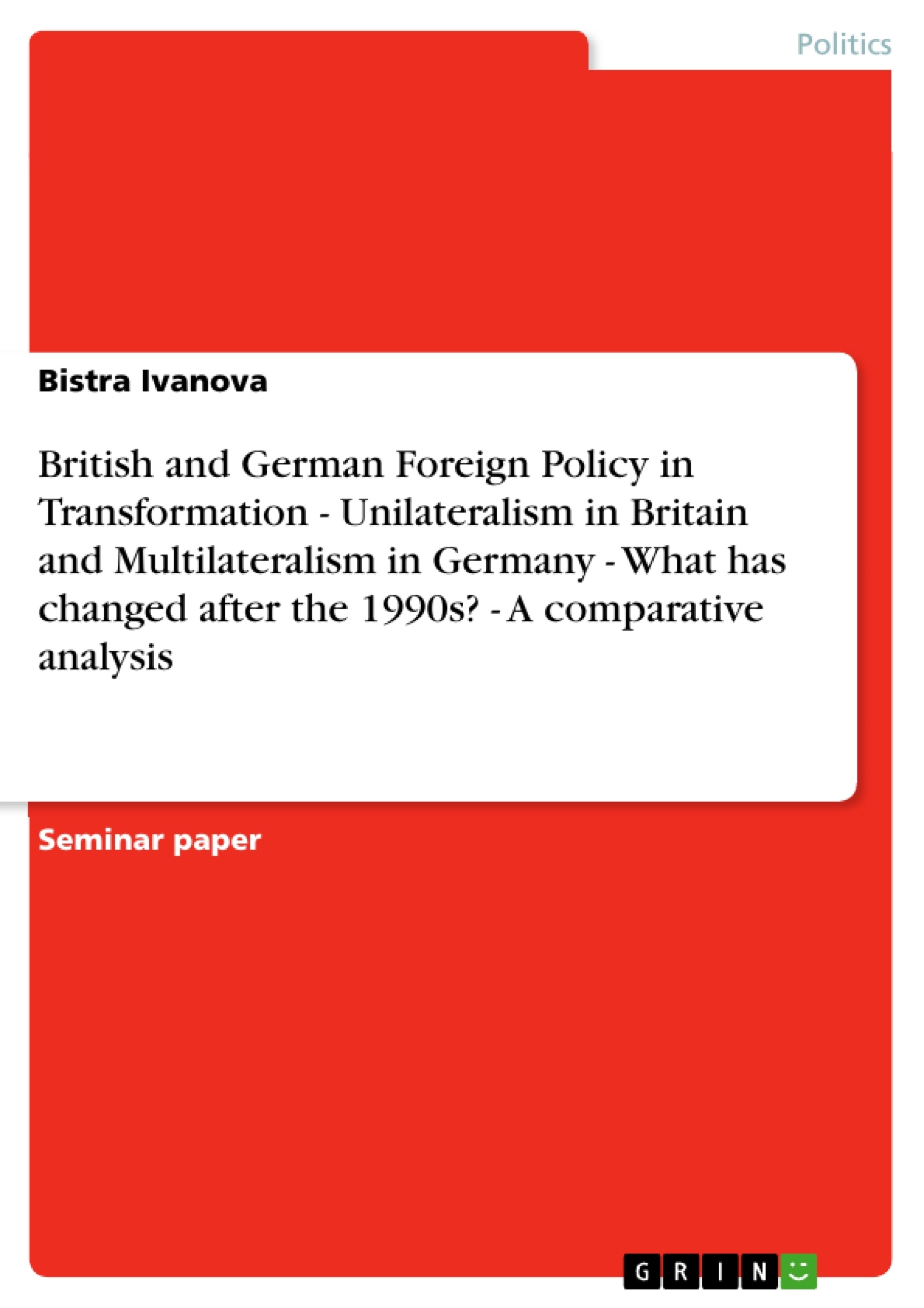The process of development of the major European states’ sovereignty after the sixteenth century is characterised mainly by different internal struggles for political authority. In comparing the international order of the Cold War period to the international system in the years after 1989, the analysts observe enormous, far-reaching changes which influenced to a great extend the foreign policies and in particular the strategies of the majors states in pursuing relations with the three significant international organizations - NATO, UN and EU. After the end of World War II Winston Churchill envisioned Great Britain as “a global power with global interests” (White, 2002). During the Cold War Period its foreign policy was largely defined by the three “concentric circles of the world politics (The British Empire/Commonwealth, the Atlantic community, and a United Europe)” (White, 2002). Identity and sovereignty were seen as essential foreign policy values. But nowadays Britain faces the need to adapt its policy to the fast changes in the modern international system. The developments in the global environment during the Post-Cold War Era have put many demands on British policy makers and have thereby defined Britain’s place in the world of today. Contemporarily Britain can be clearly seen as a “less sovereign” state, if it is described in terms of realism (Reynolds,1991). However, it is also a state that has always behaved in a sovereign manner and has actively exercised its sovereignty, rather than renouncing it. Britain today is in a situation in which its functions and the way in which it formulates its external relations are affected dramatically by the new international environment, thus challenging its status as a sovereign state. The unilateral strategy of Britain and its commitment to NATO have made it difficult for the country to be an active member in other forms of international organisations (where Transatlanticism does not play such an important role). Despite these challenges for the country’s foreign policy strategies, however, we can also observe a change in the state’s orientation towards Europe. British policy makers are reflecting about the future role of the United States in Europe, not only in terms of security matters but also economic and social development. [...]
Inhaltsverzeichnis (Table of Contents)
- INTRODUCTION
- THE COLD WAR PERIOD (1949-1990)
- GERMANY'S FOREIGN POLICY DOCTRINE
- CONTINUITY AND CHANGE OF GERMAN POLICY IN THE POST-COLD WAR ERA
- BRITAIN AS A "GLOBAL POWER WITH GLOBAL INTERESTS"
- THE POLICY MAKING PROCESS IN THE YEARS OF 1949-1990
- THE CHALLENGES OF THE POST-COLD WAR ERA
- COMPARING "UNILATERAL” GREAT BRITAIN AND "MULTILATERAL” GERMANY
- THE INFLUENCE OF EXTERNAL AND INTERNAL FACTORS
- MULTILATERALISM AND UNILATERALISM
- THE QUESTION OF SECURITY
- "EUROPEANIZATION” OF FOREIGN POLICIES
- THE ROLE OF NATO, EU AND UN – MARSHALL FUND'S 2005 SURVEY
- CONCLUSION
Zielsetzung und Themenschwerpunkte (Objectives and Key Themes)
This paper examines the transformation of British and German foreign policy in the aftermath of the Cold War. It compares and contrasts their approaches to international relations, highlighting the shift from Britain's unilateralism to Germany's multilateralism.
- The impact of the Cold War on British and German foreign policy.
- The evolution of foreign policy doctrine in both countries after 1990.
- The role of external and internal factors in shaping their respective policies.
- The contrasting approaches to multilateralism and unilateralism.
- The changing relationship between Britain, Germany, the United States, the European Union, and other international organizations.
Zusammenfassung der Kapitel (Chapter Summaries)
The paper begins by outlining the historical context of British and German foreign policy, tracing their evolution from the post-World War II period to the end of the Cold War. Chapter 2 focuses on Germany's foreign policy doctrine during the Cold War, exploring its dependence on the United States and its pursuit of security, reunification, and economic development. Chapter 3 examines Britain's position as a "global power with global interests" and its complex relationship with the United States and Europe.
Chapter 4 compares and contrasts the foreign policy strategies of Britain and Germany, examining the influence of external and internal factors on their approaches to multilateralism and unilateralism. The chapter also discusses the role of international organizations like NATO, the EU, and the UN in shaping their foreign policy goals.
Schlüsselwörter (Keywords)
The paper explores the key themes of foreign policy, multilateralism, unilateralism, security, European integration, and the role of international organizations. It examines the impact of the Cold War, the post-Cold War era, and the changing geopolitical landscape on the foreign policy strategies of Britain and Germany. Important concepts include the "global power with global interests" (Britain), the "core values" of German foreign policy, and the "political culture of restraint."
Frequently Asked Questions
How did British foreign policy change after the Cold War?
Britain transitioned from being a "global power with global interests" toward a "less sovereign" state in realist terms, having to adapt its unilateral strategy to a new international environment.
What characterizes Germany's foreign policy doctrine?
German policy is characterized by "multilateralism" and a "political culture of restraint," focusing on security and integration within the EU and NATO.
What are the three "concentric circles" of British world politics?
They are the British Empire/Commonwealth, the Atlantic community (USA), and a United Europe.
What is meant by the "Europeanization" of foreign policies?
It refers to the process where national foreign policies are increasingly aligned with and influenced by European Union frameworks and collective interests.
How do Britain and Germany differ in their approach to international organizations?
Britain has often favored unilateral strategies and NATO commitment, while Germany relies heavily on multilateral cooperation within the EU, UN, and NATO.
- Citation du texte
- Bistra Ivanova (Auteur), 2006, British and German Foreign Policy in Transformation - Unilateralism in Britain and Multilateralism in Germany - What has changed after the 1990s? - A comparative analysis, Munich, GRIN Verlag, https://www.grin.com/document/66991



